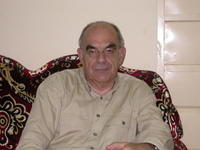Interview: UN special rep. Jan Pronk & IRIN
 IRIN News interviewed Special Rep. Jan Pronk on Thursday, August 4, 2005. The UN has a disclaimer stating that the views in this interview are of Jan Pronk's and not necessarily theirs. How interesting. Indeed.
IRIN News interviewed Special Rep. Jan Pronk on Thursday, August 4, 2005. The UN has a disclaimer stating that the views in this interview are of Jan Pronk's and not necessarily theirs. How interesting. Indeed.Passion of the Present has brought this to my attention (by having it on their site. No other way. lol.) On July 5, 2005, 2 of the "rebel" groups, Sudanese Liberation Movement/Army (SLM/A) and Justice and Equality Movement (JEM), signed a Declaration of Principles (DoP) which was hoped to ease concerns in all regions, including Darfur. There was also hope for a swift political settlement to solve the conflict.
UN Special Representative Jan Pronk (seen above) agrees that there are still many hurdles in an interview given in Nyala, the capital of South Darfur State, on July 31, 2005. Here are some excerpts:
Q: What is your assessment of the current humanitarian and security situation in Darfur?
A: The humanitarian situation has improved, if you compare it with what prevailed when the UN became actively involved in mid-2004. At that time mortality was high. The mortality went down below the usual critical threshold...
I am worried..., because we are very much dependent on foreign resources and the situation is quite fragile. ...Outside the camps it is very difficult, because food security has gone down and there is not much agricultural production any more because of the war...
...the Janjawid is attacking but to a lesser extent. There is no mass slaughter of African tribes. [HA] ...(but) you see still quite a number of people killed per month at the moment - about 100 persons - due to violence. To a great extent it is banditry, looting, crime, which goes hand-in-hand with a no-peace-no-war situation. [so why the bashing of the USA? Hmm.]
Q: Many SLA rebel commanders in the field in North and South Darfur are quite skeptical about peace and paint a grim picture of continued attacks and mistrust at the local level. Is there a disconnect between political aspirations for peace on the one hand and the reality of continued violence on the ground in Darfur, on the other?
A: That disconnect has always been there...
Please excuse me. I now understand why the UN made that disclaimer, even though this man is employed by them, represents them, and has their backing. Huh? Anyway, if you would like to read the interview, please click on the links. Have a nice day.

0 Comments:
Post a Comment
<< Home